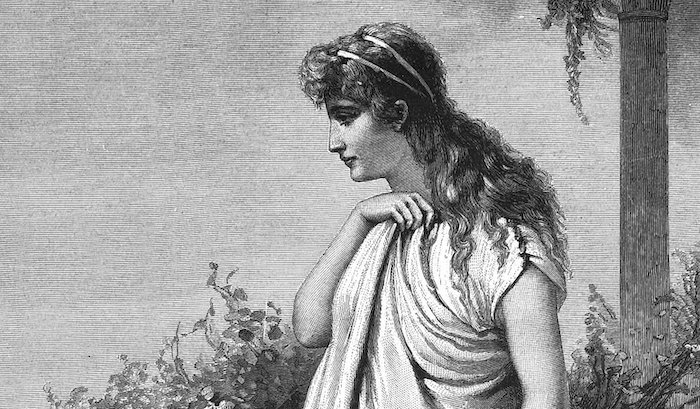Once a month here on the Molten Sulfur Blog, I run content taken from our book Archive: Historical People, Places, and Events for RPGs. This post is one of eighty entries in Archive, each more gameable than the last!
This post is brought to you by beloved Patreon backer Colin Wixted. Thanks for helping keep the lights on! If you want to help keep this blog going alongside Colin, head over to the Patreon page – and thank you!

Sappho
Sensual Poet of Ancient Greece
Sleep thou in the bosom
Of thy tender girl friend,
Telesippa, gentle
Maiden from Miletus.
Like twin petals shyly
Closing to the darkness,
Dewy on your drooping
Lids shall fall her kisses.
While her arms enfold you,
On your drowsy senses
Shall her soft caresses
Seal delicious languor.
Warm from her desireful
Heart the flush of passion
On your cheek unconscious,
With her sighs shall deepen.
All the long sweet night-time,
Sleepless while you slumber,
She shall lie and quiver
With her love’s mad longing.
Sappho was born in 610 B.C. on the Greek island of Lesbos, and died in 570 B.C, though the dates are not certain. She shared this era with the sage Thales of Miletus, considered by Aristotle to be the founder of natural philosophy; with Solon the Lawgiver, the famous Athenian statesman, poet, and moral politician; and with the legendary kings of Rome. She has been admired for ages for the beauty of her lyric poetry, which often paid homage to the gods, especially to Aphrodite, the goddess of love and lust. She is regarded by multiple poets and even the philosopher Plato as an earthly tenth muse.
Little is known of this ancient Greek poet but her art. Her poetry was most admired for its viscerally sensual themes, expressing Sappho’s love for both gods and mortals – and both men and women. Sappho’s poems were eventually compiled into nine papyrus volumes at the Library of Alexandria, but the bulk of her work was lost in time. What few poems remain speak clearly of her love and infatuation with women. Her poems were meant to be performed to the music of the lyre, so their expressions of love were meant to be public. Sappho was one of the first ancient women to express herself so erotically, and she was both celebrated and berated for it in different circles.
As for her personal life, much of what we think we know is just hearsay. Sappho is believed to have had two brothers, Larichus and Charaxus. Some legends about her say she was married to a wealthy man from the island of Andros by the name of Cercylas. And one of her poems mentions a daughter named Cleis. There are many questions surrounding Sappho’s sexuality, as her amorous interest in men was so notorious that it was grossly caricatured in later entertainment, but as stated before, many of her surviving works, including a hymn to the goddess Aphrodite, show same-sex desires. Another legend surrounding her death claims she threw herself from a cliff at a young age due to her unspoken love for a male sailor named Phaon, but her own work disproves an early death. Despite her poetry holding scant political allusions, it is said Sappho was exiled to Sicily for a short time for political dissent.
Though she is credited with creating the Sapphic stanza, Sappho’s clearest modern legacy lies perhaps in language. The term ‘sapphic’ – being of or relating to sexual relations between women – refers to her. Similarly, the term ‘lesbian’ comes from the name of Sappho’s home island of Lesbos.
Sappho in Play
In a campaign, an NPC based on Sappho would be highly respected in life and even after death. She would likely speak elegantly, and would not keep her sexuality and attractions secret, nor would she find any shame in them. Sappho is the type of woman who would express her infatuation with one of your PCs through erotic poetry performed at the local gathering place. Maybe the profound beauty of her art shows her to be a hidden sibyl or prophet, and the PCs must court her to learn her secrets in pillow talk. Maybe the gods hold Sappho’s work in such high esteem that she has influence among them, especially the other nine muses. And if your campaign setting includes bardic magic, her poetry would make her a foe to be feared.

Come follow and chat with me on social media! On Twitter, I’m @moltensulfur. On Facebook, I’m Molten Sulfur Press. On Mastodon I’m @MoltenSulfur@dice.camp.






